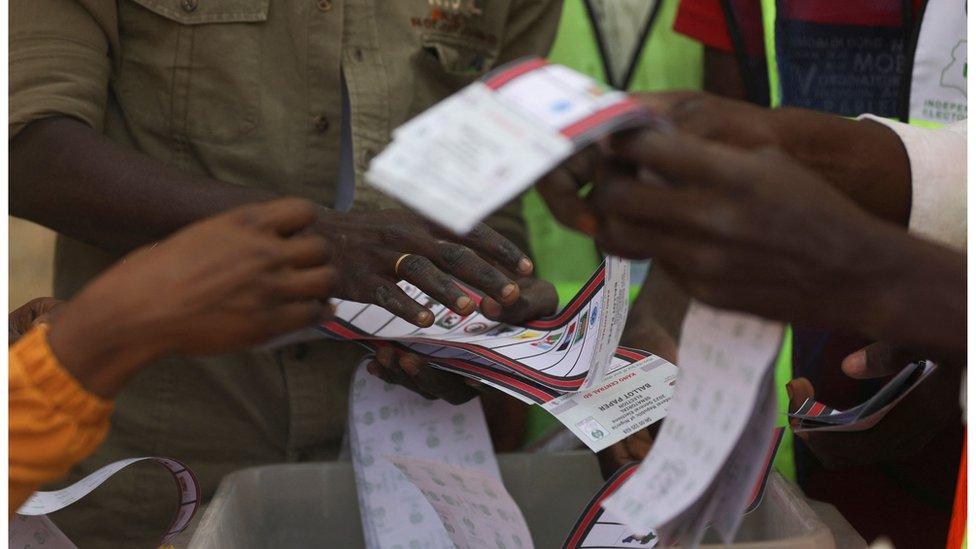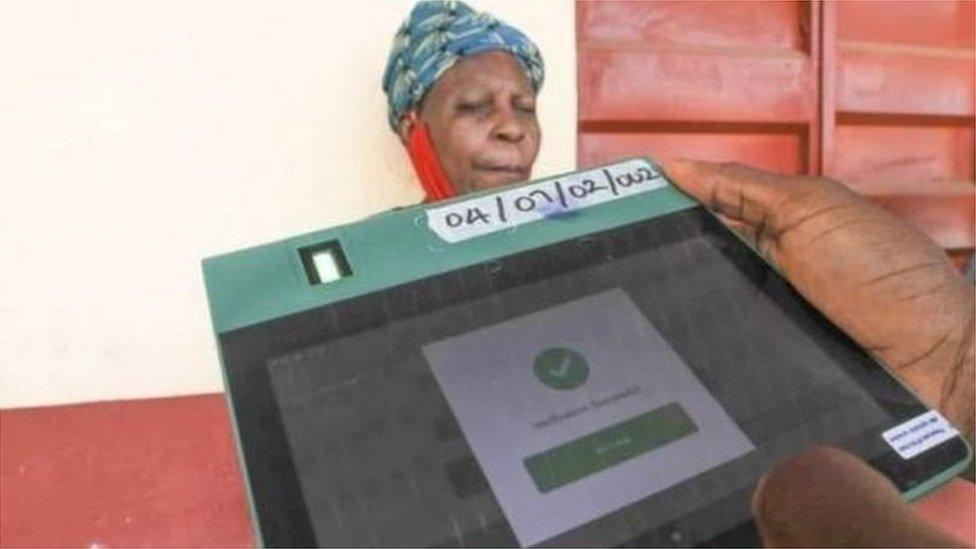Nigeria election 2023: Why the Labour Party was not on some ballots
- Published

Million of Nigerians are anxiously awaiting the results of the presidential and parliamentary elections, which are expected to be dominated by three political parties - the ruling All Progressives Congress and the opposition Peoples Democratic Party and the Labour Party which was relatively unknown until last year.
But hours before voting began, images showing that the Labour Party was missing from some senate and house of representatives ballot papers were widely shared on social media.
Supporters of the party alleged that there was a deliberate plot to prevent them from voting for the party.
What are the claims?
The party's official handle tweeted "Labour Party Logo missing in some ballot papers" accompanied by an amateur video showing an election official flipping through the pages of a ballot booklet. A voice is heard saying: "There is no Labour Party on the senatorial [ballot paper] here in Lagos. The presidential [ballot paper] has it."
Allow X content?
This article contains content provided by X. We ask for your permission before anything is loaded, as they may be using cookies and other technologies. You may want to read X’s cookie policy, external and privacy policy, external before accepting. To view this content choose ‘accept and continue’.
Labour Party supporters around the country also used Twitter and Facebook to share photos and videos from their polling units reporting the absence of the logo on parliamentary ballot papers.
Allegations that Nigeria's Independent National Electoral Commission (Inec) was biased for deliberately leaving out the party began to spread.
Others posted that they had been given ballot papers with the logo of the party but without the name of the party, external, saying that Inec purposely omitted the party's name to confuse voters.
But the official logo of the Labour Party does not carry the name of the party, only its slogan -"Forward Ever". Inec prints ballot papers with official logos sent in by the party.
Was Labour Party missing on the ballot papers?
Senior Inec official Zainab Aminu Abubakar told the BBC that the Labour Party was indeed missing from some parliamentary ballot papers. But she said that is because the party did not submit the names of its candidates for these constituencies.
She said the party said it had obtained a court order, compelling it to include Labour Party candidates on the ballot papers for parliamentary elections.
Inec then asked to see the court order but received no official reply before election day. Ms Abubakar said if the party had provided the court judgement even a day before, the parliamentary election for the constituencies affected could have been arranged for a later date.
The BBC has tried to reach the party for clarification but has received no response.
A statement released by the Labour Party Ondo state secretary also said the high court in Abuja had ordered Inec to accept the names of the party's candidates for parliamentary elections in some states but the commission deliberately left them out. It said this was a move to disenfranchise voters.
It is not clear how many parliamentary constituencies have been affected.
Head of Transparency International in Nigeria and chairman of the Transition Monitoring Group (TMG), Auwal Ibrahim Musa Rafsanjani, backed up the electoral commission.
"Inec announced a deadline for political parties to submit the names of all their candidates. If a party does not provide names of candidates at the stipulated time, then the party is responsible for the omission of its logo on ballots," he told the BBC.
"Inec shouldn't have to break its rules for any party, that may lead to impunity. It could also create legal crisis for the electoral commission. People are watching and monitoring the entire process."
So why did Inec remove the party from the ballot papers?
The electoral commission has strict rules about who it puts on ballot papers.
It will remove or omit a political party if it did not conduct primary elections for the seat. If it conducted the primaries but did not invite Inec to monitor them, the commission will still not print the party's name on the ballot box, Ms Abubakar told the BBC.
Typically, the electoral commission announces a timeframe for political parties to submit the names of their candidates in all contested seats.
Even if it monitors a party's primaries but the party fails to upload the names of its candidates to an online portal approved by the commission before the end of the deadline, it risks losing a place on the ballot paper and would not be listed as a party contesting the seat, the Inec official said.
What other claims are people making about Inec?
Allegations of plans to manipulate the votes by the ruling APC and the electoral commission were shared by prominent social media users, external, casting doubt about the autonomy and morality of the commission.
Some people on social media have accused Inec officials of using the electronic voting system known as Bvas for rigging, with some opposition supporters threatening violence if their preferred candidate didn't win.
However, they have not provided any evidence.
There have been widespread reports of machines failing to accredit voters in some areas of the country due to technical problems, or the absence of an internet connection. Several people have said they used hot spots on their own mobile phones to enable election officials to log in.

Reports of Inec using the electronic voting machine Bvas for rigging have emerged on social media
Opposition supporters also alleged that some people were illegally logged into the electoral commission's website and were inputting fabricated election results in favour of the APC, external.
But the website turned out to be a phishing website that replicated the interface of the electoral commission's website and was being shared as a screen recording. The Inec website was not compromised.
It is equipped with a portal where election results can be viewed in real-time.
Inec said this portal had been "slow and unsteady" but stressed it was due to technical hitches, and not because of an intrusion into or sabotage of its system.
The commission said election results were safe on both the portal and the Bvas electronic voting system and cannot be tampered with.

BASIC GUIDE: What you need to know about Nigeria's elections
NIGERIA IN CHARTS: The challenges for the next president
BORNO STATE: Has Buhari tackled jihadist threat?
LAGOS STATE: Why the battle for Lagos could decide the election
KATSINA STATE: 'You let kidnappers take me, now you want my vote'
RIVERS STATE: The oil land with no electricity
FULL COVERAGE: Nigeria elections 2023
